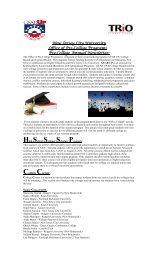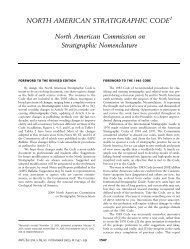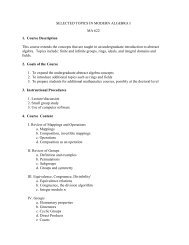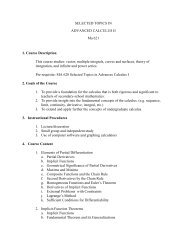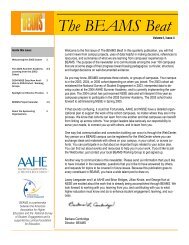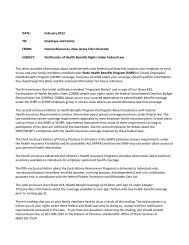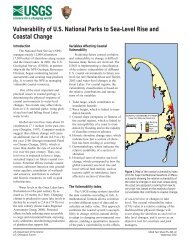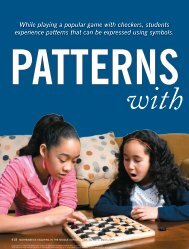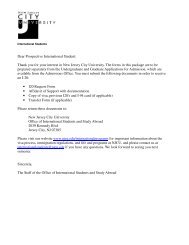Ancient Political Theory
Ancient Political Theory
Ancient Political Theory
- No tags were found...
You also want an ePaper? Increase the reach of your titles
YUMPU automatically turns print PDFs into web optimized ePapers that Google loves.
<strong>Ancient</strong> <strong>Political</strong> <strong>Theory</strong>Aristotle’s Politics
Humanity: Essence vs Contingency Aristotle’s description of essence of polis Polis is that arena which allows us to behuman Means we need to understand the essenceof man (mankind) That is, to know “real” political society,need to know human essence, need toknow human nature
Human Nature What is human nature? Distinguish between attributes which arecontingent and those which are essential– Contingent: those of our qualities which wecan do without– Essential: those attributes which we can’t e.g. analogy with personal identity unchosen attributes so integral to an understandingof what you are, the absence of which would entailchange in one’s identity
Human Nature For Aristotle, human beings are thezoon politikon, defined by reason,speech, public dialogue Polis, then, is not production of justmere life, but good life Mere life is necessary, but it is not anintegral part of the good lifeback
Humanity: Essence vs Contingency If <strong>Political</strong> life is so crucial, then weneed to know how best to do it
II. Classification of Constitutions The State (Polis):– An association of citizens in aconstitution– “The city is the multitude of suchpersons that is adequate with a view toa self-sufficient life, to speak simply”(III, 1)back
II. Classification of Constitutions Citizens:“A citizen proper is not one by virtue of residencein a given place: for even aliens and slaves mayshare the common place of residence…” (III, 1,1274b).“Nor those who share in legal processes only tothe extent of being entitled to sue and be sued inthe courts…” (III, 1, 1274b).
II. Classification of Constitutions“Who the citizen is, then, is evidentfrom these things. Whoever is entitledto participate in an office involvingdeliberation or decision is, we can nowsay, a citizen in this city…” (III, 1,1275b)
II. Classification of Constitutions Note, this means that not everyonenecessary for the city counts as a citizen:“The truth is that we cannot include as citizensall who are necessary to the city’s existence…The best form of city will not make themechanic a citizen” (III, 5, 1277b).(recall the prior discussion of natural slaves)back
II. Classification of Constitutions The Constitution:“The regime [constitution] is anarrangement of a city with respect to itsoffices, particularly the one that hasauthority over all” (III, 6, 1278b)The “one with authority over all” defines thesovereign. It is the ultimate ruler in the affairsof the city.back
II. Classification of Constitutions Classifies on the basis of two criteria:– Size of the Ruling Regime– “End” of the Regime
Aristotle’s Regime Types“End” of RegimePublic GoodPrivate GainSizeOfRegimeMonarchyAristocracyTyrannyOligarchyPolityDemocracyback
Aristotle’s Regime Types“End” of RegimePublic GoodPrivate GainSizeOfRegimeMonarchyAristocracyTyrannyOligarchyPolityDemocracy
Aristotle’s Regime Types“End” of RegimePublic GoodPrivate GainSizeOfRegimeMonarchyAristocracyTyrannyOligarchyPolityDemocracy
Aristotle’s Regime Types“End” of RegimePublic GoodPrivate GainSizeOfRegimeMonarchyAristocracyTyrannyOligarchyPolityDemocracy
Aristotle’s Regime Types“End” of RegimePublic GoodPrivate GainSizeOfRegimeMonarchyAristocracyTyrannyOligarchyPolityDemocracy
Aristotle’s Regime Types“End” of RegimePublic GoodPrivate GainSizeOfRegimeMonarchyAristocracyTyrannyOligarchyPolityDemocracy
Aristotle’s Regime Types“End” of RegimePublic GoodPrivate GainSizeOfRegimeMonarchyAristocracyTyrannyOligarchyPolityDemocracy
III. Conclusion & Preview Given these different regime types,which one is best? What is the best regime? What explains the transformation ofthese regimes?back



